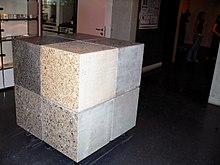Cubic metre
| Cubic metre | |
|---|---|
 One cubic metre of concrete (representing the world annual production per inhabitant). | |
| General information | |
| Unit system | SI |
| Unit of | volume |
| Symbol | m³, ㎥ |
The cubic metre (in Commonwealth English and international spelling as used by the International Bureau of Weights and Measures) or cubic meter (in American English) is the SI derived unit of volume.[1] Its SI symbol is m3.[1] It is the volume of a cube with edges one metre in length. An alternative name, which allowed a different usage with metric prefixes, was the stère, still sometimes used for dry measure (for instance, in reference to wood). Another alternative name, no longer widely used, was the kilolitre.
Conversions
1 cubic metre = 1000 litres (exactly)[2][3] ≈ 35.3 cubic feet ≈ 1.31 cubic yards ≈ 6.29 oil barrels ≈ 220 imperial gallons ≈ 264 US fluid gallons
A cubic metre of pure water at the temperature of maximum density (3.98 °C) and standard atmospheric pressure (101.325 kPa) has a mass of 1000 kg, or one tonne. At 0 °C, the freezing point of water, a cubic metre of water has slightly less mass, 999.972 kilograms.
It is sometimes abbreviated to cu m, m3, M3, m^3, m**3, CBM, cbm when superscript characters or markup cannot be used (e.g. in some typewritten documents and postings in Usenet newsgroups). The "cubic metre" symbol is encoded by Unicode at code point U+33A5 ㎥ SQUARE M CUBED ❰ ㎥ ❱.[4]
Multiples and submultiples
Multiples
- Cubic decametre
- the volume of a cube of side length one decametre (10 m)
- equal to a megalitre
- 1 dam3 = 1000 m3 = 1 ML
- Cubic hectometre
- the volume of a cube of side length one hectometre (100 m)
- equal to a gigalitre
- in civil engineering abbreviated MCM for million cubic metres
- 1 hm3 = 1000000 m3 = 1 GL
- Cubic kilometre
- the volume of a cube of side length one kilometre (1000 m)
- equal to a teralitre
- 1 km3 = 1000000000 m3 = 1 TL (810713.19 acre-feet; 0.239913 cubic miles)
Submultiples
- Cubic decimetre
- the volume of a cube of side length one decimetre (0.1 m)
- equal to a litre
- 1 dm3 = 0.001 m3 = 1 L
- (also known as DCM (=Deci Cubic Meter) in Rubber compound processing)
- Cubic centimetre[5]
- the volume of a cube of side length one centimetre (0.01 m)
- equal to a millilitre
- 1 cm3 = 0.000001 m3 = 10−6 m3 = 1 mL
- Cubic millimetre
- the volume of a cube of side length one millimetre (0.001 m)
- equal to a microlitre
- 1 mm3 = 0.000000001 m3 = 10−9 m3 = 1 µL
Notes
- ^ a b Bureau International de Poids et Mesures. "Derived units expressed in terms of base units Archived 2012-07-16 at the Wayback Machine". 2014. Accessed 7 August 2014.
- ^ From 1901 to 1964 the litre was defined as the volume of one kilogram of pure water at 4°C and 760 millimetres of mercury pressure. During this time, a litre was about 1.000028 dm3. In 1964 the original definition was reverted to.
- ^ "Archived copy". Archived from the original on 2009-10-01. Retrieved 2010-03-05.
{{cite web}}: CS1 maint: archived copy as title (link) - ^ Unicode Consortium (2019). "The Unicode Standard 12.0 – CJK Compatibility ❰ Range: 3300—33FF ❱" (PDF). Unicode.org. Retrieved May 24, 2019.
- ^ The cubic centimetre is the base unit of volume of the CGS system of units. The colloquial abbreviations "cc"/"㏄" and "ccm" are not SI but are common in some contexts such as cooking, engine displacement and medicine.
